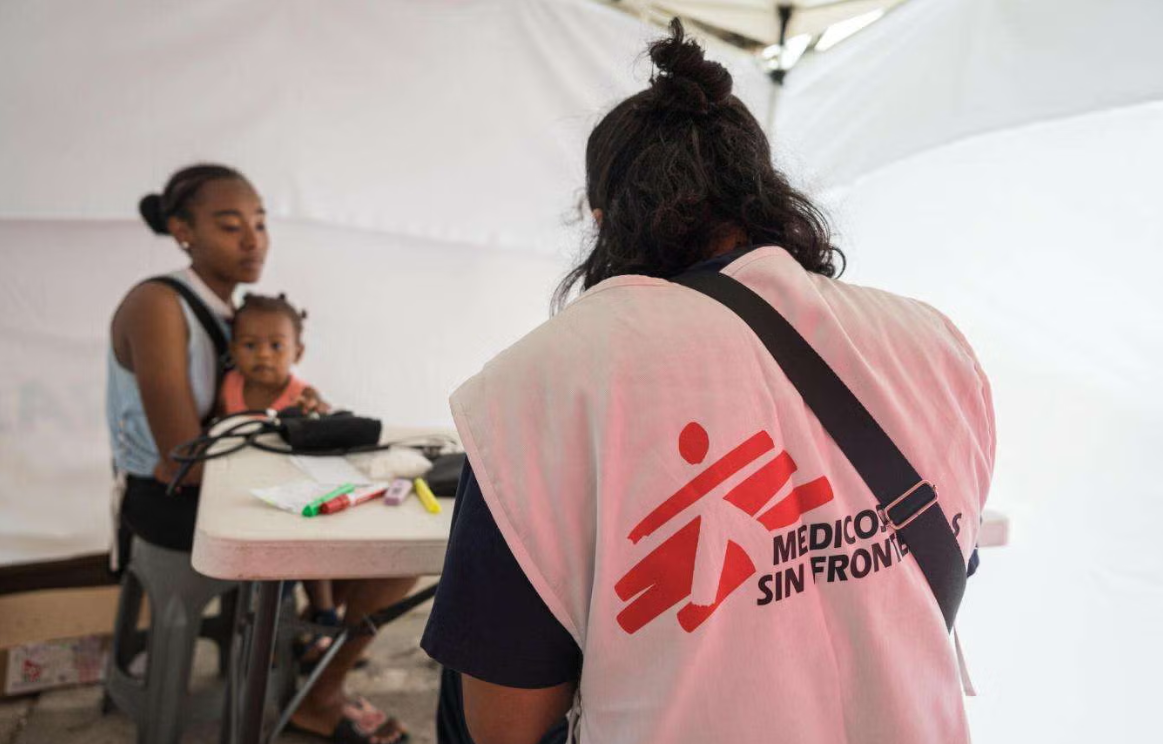“I had many difficulties breastfeeding my son because I wasn’t eating well and the baby was always latched onto my breast, so I often felt dizzy,” says Yolady Valentina Pérez Salas, a mother from Venezuela and a patient at the Doctors Without Borders/Médecins Sans Frontières (MSF) Comprehensive Care Center for Victims of Extreme Violence (CAI, in Spanish) in Mexico, which offers specialized medical and mental health care.
Yolady and her 18-month-old son, Javerson Alexandro, began traveling north from Peru when he was just 6 months old. “Along the way, my baby became malnourished because he didn’t eat much,” Yolady says. “He always wants to be on the breast, and people say it’s not doing anything for him anymore, but I’ve tried to wean him, and I can’t.”

A woman watches while her daughter is attended by MSF staff at a mobile clinic located in the municipality of Arriaga, Chiapas. | Mexico 2023 © MSF
Historically, the Latin American migration corridor has been one of the busiest and most violent in the world. This year, following a series of executive measures implemented by US President Donald Trump and other regional governments, migration policies changed drastically: main asylum pathways were shut down and security along the Mexican border was reinforced. As a result, there has been a historic drop in migration flows, leaving thousands of people stranded in various parts of Mexico and Central America.
These policies have increased the risks for migrants, who are forced to use increasingly dangerous routes and methods in search of refuge, or end up trapped in unsafe locations where they are at higher risk of kidnapping, extortion, and sexual violence.
When I stopped breastfeeding my son, it was very hard—for both of us. It was a deeply emotional bond. While it was distressing and worrying to breastfeed him in the environment we were in—with no time or comfortable space—it also connected me to feelings like love, patience, and compassion.MSF patient
Between January 2024 and May 2025, MSF teams carried out more than 90,000 primary health consultations and 11,850 sexual and reproductive health consultations in migration and displacement-related projects in Panama, Honduras, Guatemala, and Mexico. Over the years our teams have witnessed a growing trend: more and more women traveling alone or with their young children, many of them breastfeeding.
“I feel bad because I’m far from my country and we feel alone—it’s not the same as having the support of my mother and siblings,” Yolady reflects. For her, breastfeeding is also a way to preserve cultural traditions amid displacement.
Difficult conditions inhibit breastfeeding
According to the World Health Organization (WHO), improving global breastfeeding rates could save the lives of more than 820,000 children each year. This figure is especially relevant in extremely vulnerable contexts like migration.
However, the harsh conditions of the migration route—including limited access to clean water, lack of nutritious food for lactating mothers, absence of safe and private spaces, constant stress that can inhibit milk production, inadequate health care services, and lack of emotional support—all create a web of obstacles that directly affect many women’s ability to breastfeed adequately.
Jocelyn, a mother from Guatemala, shares a similar experience: “I’ve had trouble breastfeeding my baby because he has a big appetite—he nurses and nurses, but he’s still hungry until I give him a bottle and then he settles. I have another daughter who’s already 12, but with him it’s been harder. Sometimes I wonder why my milk isn’t enough for him.”

